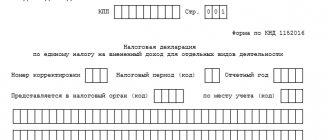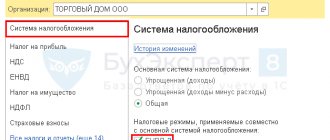From 01/01/2021, the UTII tax special regime ceases to exist (Federal Law dated 06/02/2016 No. 178-FZ), and the authorities do not plan to extend its application. In this regard, by the end of this year, organizations and individual entrepreneurs on UTII will have to change the tax regime. We tell you how to do it correctly.
How to compare tax regimes in 1C:Accounting 8 (rev. 3.0)
How to compare tax regimes in 1C:Accounting 8 (rev. 3.0), taking into account regional characteristics
Termination of activities on UTII. Refusal from UTII
The tax system “Unified Tax on Imputed Income” (UTII) has been abolished since 01/01/2021. Everything described in this article was applied only during the period of validity of UTII.
Currently, a business can either switch from UTII to another special system, or will automatically be transferred to OSNO. What special taxation system can replace UTII, read in the article “Where to switch from UTII.” The unified tax on imputed income (UTII) is a certain special regime in which the amount of tax on the amount of income imputed (established) by the state is subject to payment to the budget.
The areas of activity in which its use is permitted are listed in paragraph 2 of Art. 346.26 of the Tax Code of the Russian Federation.
The taxpayer, that is, the person using this taxation regime, can refuse to use it either voluntarily or compulsorily.
Deregistration of UTII on one's own initiative is usually caused by:
- termination of a certain type of activity in connection with which it was planned to use a special taxation regime;
- closure or liquidation of an enterprise (firm, individual entrepreneur);
- making a decision to reorganize the business, and therefore the right to use the specified special regime is unacceptable.
Forcibly, an entrepreneur or company can be automatically transferred by the tax authority to the general taxation system for the following reasons (clause 2.3 of Article 346.26 of the Tax Code of the Russian Federation):
- if the number of employees of such a company over the last year exceeds 100 people;
- if the share of participation in such an enterprise of another company is more than 25%.
Based on the results of an audit for a certain tax period, the tax authority has the right to deregister UTII for such a taxpayer. In this case, in the manner established by clause 2.3 of Art. 346.26 of the Tax Code of the Russian Federation, the specified subject will be considered to have switched to the general taxation regime from the start date of the period in which these violations were identified.
Is it possible to combine UTII and other tax regimes in 2021?
Many retailers sell different types of products. For example, a store may have not only fur, but also other types of clothing. Shoe care products and other related products are often sold along with shoes. After July 1, 2021, pharmacies can simultaneously sell both previously released unlabeled drugs and new labeled drugs.
The law does not prohibit combining UTII with other tax regimes. For businessmen who simultaneously retail labeled and unlabeled goods, the most profitable option in 2021 will be a combination of UTII and simplified tax system.
It makes no sense for such sellers to switch to PSN in 2021: the ban on trading in labeled goods applies not only to UTII, but also to the patent system. Under NPA, you can only trade goods of your own production. In addition, PSN and NPD are only suitable for entrepreneurs. And OSNO is unprofitable for most businessmen due to the high tax burden and complex accounting.
Previously, experts from the Ministry of Finance believed that it was possible to use two tax regimes for one type of activity only if the objects are located in different municipalities (letter dated February 17, 2017 No. 03-11-11/9389).
However, the latest clarifications do not contain such restrictions. It is possible to use different tax regimes for different product groups in one store or pharmacy. In this case, the businessman must organize separate accounting of property, income and expenses (letter of the Ministry of Finance of Russia dated December 20, 2019 No. 03-11-09/100308).
We wrote about how to keep separate records in the article “Combining special regimes: features of combining the simplified tax system and UTII.”
Notification of refusal of UTII: sample filling
A person applying UTII also has the right to refuse to use this taxation regime. To do this, you must submit an application of the appropriate form.
Order of the Federal Tax Service of Russia dated December 11, 2012 No. ММВ-7-6/ [email protected] approved forms for filing applications for registration and deregistration of UTII, as well as the procedure for filling them out.
To date, 2 forms have been approved:
- Appendix 3 (form 3) of this order contains a form for organizations planning measures to deregister UTII.
- Appendix 4 (form 4) of this order contains a sample application on the basis of which an entrepreneur can inform about the deregistration of UTII.
It is possible to fill out these forms either using printed text or manually using a black or blue ballpoint pen.
There is 1 window for each character in the statements. Empty windows must be filled in with dashes.
When completing these forms using printed media, you must use capital letters in 18-point Courier New font.
Applications for deregistration of UTII for a company can be made by following the link: Application for deregistration of UTII.
Applications for deregistration of UTII for individual entrepreneurs can be made by following the link: Application for deregistration of UTII for individual entrepreneurs.
The essence of the changes:
The debate about whether or not the UTII should be abolished does not subside.
When adopting laws abolishing UTII by 2021 and replacing it with a patent taxation system for individual entrepreneurs, the legislator pursued a clear goal: “increasing the number of taxpayers under the general taxation regime and the simplified taxation system to increase tax revenues to the federal budget and the budgets of the constituent entities of the Russian Federation.” It seems that this idea is correct and is aimed at making everyone happy: entrepreneurs do not hide their income, and the state receives taxes. Therefore, the protests of entrepreneurs also become clear, and the desires and aspirations of civil servants are understandable.
We understand that if the UTII is abolished, mainly legal entities (micro-enterprises) will suffer, since they will not have an alternative in the form of a simplified tax system based on a patent and the costs of the accounting process and taxation will increase. Individual entrepreneurs will only change the form of reporting and payment of tax.
Deadlines for deregistration of UTII and the moment of transition to another taxation system
Based on clause 3 of Art. 326.48 of the Tax Code of the Russian Federation, an application for termination of UTII must be submitted to the appropriate authority within 5 days from the date of completion of such activities in which it was possible to use the specified special regime.
The date of removal from the specified special tax regime will be considered:
- The date of completion of a certain type of activity specified in the application itself.
- The date from which the transition to another tax regime was made.
- The date from which the subject is obliged to switch to the general taxation regime in connection with violations discovered in it (clause 2.3 of Article 346.26 of the Tax Code of the Russian Federation), namely: the date of the beginning of the tax period, which, in turn, is equal to 1 quarter (Article 346.30 Tax Code of the Russian Federation).
A taxpayer may refuse to pay UTII at his own request by submitting an application in the prescribed form to the tax authority.
However, there may also be cases of forced deprivation of the right to use the specified special taxation regime in the form of payment of UTII. You can find more complete information on the topic in ConsultantPlus. Free trial access to the system for 2 days.
Reasons for liquidation of UTII
This type of taxation was introduced more than 15 years ago to bring entrepreneurial activity “out of the shadows,” which at that time could not be well controlled by fiscal authorities. In the current conditions, UTII itself has begun to be used to hide real income and evade taxes by large companies. According to tax officials, the damage due to such illegal actions amounted to approximately 4.5 trillion rubles.
Deadline for canceling UTII
For some entrepreneurs, the ban on activities on UTII comes into force on January 1, 2021. Law No. 325-FZ of September 29, 2019 has already been signed on this. It will affect small businesses in the retail sector:
- clothing and other products made from natural fur;
- medicines;
- any shoes.
All entrepreneurs involved in such industries will have to choose a new tax regime. For other businessmen, the government promised to remove UTII in 2021, but by Law No. 178-FZ of June 2, 2016, the decision was postponed until 2021. Although the new law on the complete elimination of imputation has not yet been adopted, both the Ministry of Finance and legislators have very serious intentions in this regard. Therefore, it is worth considering in advance which optimal system an entrepreneur with a specific type of activity can switch to.
Is there a third person interested?
In the heat of the battle over this tax, we hear only two sides: entrepreneurs and legislators. Are these all interested parties? Who else cares about protecting this tax?
To answer this question, it is worth clarifying how many taxes can be managed at the municipal level. The answer is simple - this is land tax, property tax for individuals and UTII. According to Art. 61, 61.1 and 61.2 of the Budget Code of the Russian Federation, they are entirely the income of the municipal budget.
At the same time, based on the economic content of the taxes listed above, the following conclusion can be drawn: UTII is opposed to the property tax of individuals and land tax: the greater the amount of UTII, the less tax the municipal budget will receive in the long term from property purchased by individuals.
Thus, with the help of UTII we can engage the population by creating favorable conditions for them to receive income, which will subsequently be used to purchase land and property by these individuals. In addition, according to Art. 61.2 of the Budget Code of the Russian Federation, an increase in the salaries of employees of these individual entrepreneurs will also affect the increase in budget revenues (10% of the collected PFDL).
Thus, one can imagine the following idealized picture in an ordinary Russian city:
- the municipality determines which types of activities are important and maintains low prices for certain types of products (bread, grocery, bookstores, clothing stores receive low K2 coefficient rates);
- the emphasis is on ensuring that entrepreneurs feel comfortable working throughout the city and that stores are within walking distance (the K2 value is adjusted depending on the location of the retail outlet);
- authorities limit the wide sale of certain types of goods (shops selling beer, alcohol, cigarettes receive maximum values of K2 coefficients);
- the authorities are trying to provide the population with household services (the K2 rate for household services is set as low as possible and is differentiated depending on the type of service provided);
- the authorities are puzzled by the provision of medical and veterinary services (medical and veterinary services receive symbolic meanings of K2),
- municipal authorities want to organize clothing fairs for sellers from other regions (they set a coefficient for traveling trade in things that are also symbolic);
- etc.
This list can be continued endlessly, since there can be many goals and ways to achieve them using the K2 coefficient.
The consequences of this idealized picture are increased incomes, decreased employment and, as a consequence, increased consumption. People are starting to acquire real estate and land, which leads to an increase in housing construction. The result of all this is an increase in tax collection, as a consequence - the growth of the city and tax revenues, the possibility of further influence on the development of the municipality.
If you violate this idealized picture, then, accordingly, you can understand what result the municipal authorities will receive on their territory.
Thus, municipal authorities are a third interested party, which currently has not expressed its opinion on the upcoming changes to UTII.








